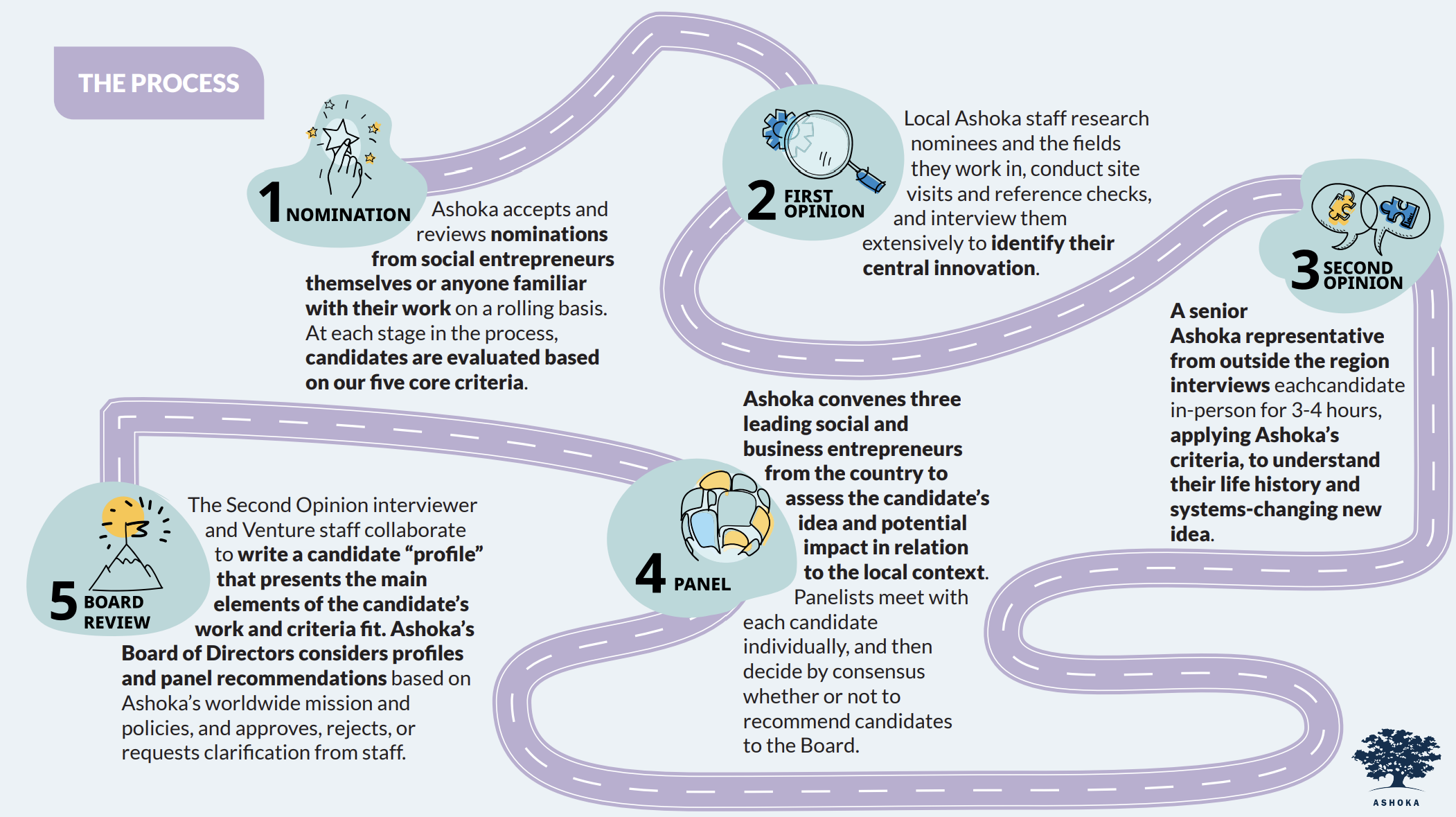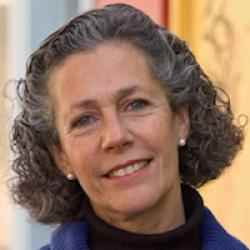Selection Criteria
What characterizes a leading social entrepreneur?
How does Ashoka decide which candidates to recommend and which to turn away?
Ashoka's selection process is anchored by our five criteria against which all Fellow candidates are evaluated:
🪄New Idea
Ashoka cannot elect someone to the Fellowship unless he or she is possessed by a new idea—a new solution or approach to a social problem—that will change the pattern in a field, be it human rights, the environment, or any other. We evaluate the idea historically and against its contemporaries in the field, looking for innovation and real change potential.
⚙️👤 Creativity
Successful social entrepreneurs must be creative both as goal-setting visionaries and as problem solvers capable of engineering their visions into reality. Creativity is not a quality that suddenly appears—it is almost always apparent from youth onward. Among the questions we might ask: Does this individual have a vision of how he or she can meet some human need better than it has been met before? Does the candidate have a history of creating other new visions?
🧩Entrepreneurial Quality
Perhaps our most important criterion, entrepreneurial quality is the defining characteristic of first class entrepreneurs. It defines leaders who see opportunities for change and innovation and devote themselves entirely to making that change happen. These leaders often have little interest in anything beyond their mission, and they are willing to spend the next ten to fifteen years making a historical development take place. This total absorption is critical to transforming a new idea into reality, and it is for this reason that Ashoka insists that candidates commit themselves full-time to their ideas during the launch phase.
🌱Social Impact of the Idea
This criterion focuses on the candidate's idea, not the candidate. Ashoka is only interested in ideas that it believes will change the field significantly and that will trigger nationwide impact or, for smaller countries, broader regional change. For example, Ashoka will not support the launch of a new school or clinic unless it is part of a broader strategy to reform the education or health system at the national level and beyond.
🕊️Ethical Fiber
Social entrepreneurs introducing major structural changes to society have to ask a lot of people to change how they do things. If the entrepreneur is not trusted, the likelihood of success is significantly reduced. Ashoka asks every participant in the selection process to evaluate candidates for these qualities rigorously. To do so often requires one to resort to instinct and gut feelings, not just rational analysis. The essential question is: "Do you trust this person absolutely?" If there is any doubt, a candidate will not pass.
Ashoka has additional areas we consider when evaluating nominations. These will not result in automatic rejections, but more information may be required during the initial selection process. If you are unsure, you may still submit the nomination to be reviewed by a local representative.
Full Time
Candidates should work on their idea full-time or be prepared to work on their idea full-time upon election as an Ashoka Fellow. Ashoka provides financial support to social entrepreneurs to dedicate themselves fully to their work.
Legal Structure
Candidates should have a non-profit entity leading their work and create legal safeguards that ensure any for-profit structures are controlled by the non-profit entity.
Arts, Theatre, & Sports
Ashoka supports candidates who use arts, theatre or sports practices as long as these means serve a broader and comprehensive strategy to solve social problems. Candidates with innovations in arts, theatre or sports which are not directly linked to societal challenges will not be considered for the Fellowship
Religious Affiliation
Ashoka only supports individuals who are working towards the general freedom and equality of all. Ashoka does not associate with or support any particular religion, theology, or spirituality, and is accepting and neutral on all matters of religious belief. If a candidate in any way imposes their views, beliefs, or practices on others who do not subscribe to them strictly voluntarily, Ashoka will not consider that candidate for the Fellowship.
Local Connection
Candidates should have a deep understanding of local systems and the root causes of social and environmental challenges. In most cases, this level of understanding typically requires that the candidate be a member of the society where they are driving change and thus reside in the country or region they impact.
Political Parties
Candidates cannot currently represent a particular political party or have their work to be used for partisan political purposes. Candidates cannot be members of parties that advocate violence, totalitarianism (right, left, or other), or discrimination.
Stage of Impact
Candidates’ work should be beyond the ideation or theoretical stage. Ashoka supports social entrepreneurs who have begun to implement their work, have achieved positive impact, and are ready to scale up nationally or internationally.
The Selection Process for the Ashoka Fellowship
Ashoka searches the world for leading social entrepreneurs through an intensive, human-centered process, selecting them into our Ashoka global, trust-based fellowship of peers.
The process of selection is a transformative and enlightening experience.
Candidates articulate their innovations, and how they have the potential to change sector-wide systems. They scrutinize their strategies and methods, and reflect on how they engage as individuals and leaders in today’s world. The selection process is not simply a means to an end, but rather generates robust discussion, sharpens ideas, and gives room for a journey of self discovery and growth.
The selection process phases are:
The Ashoka Fellowship
For more than 40 years, Ashoka has built and nurtured the largest network of leading social entrepreneurs in the world. After a rigorous selection process, they are introduced to a life-long fellowship, where every member is committed to championing new patterns of social good. We encourage Ashoka Fellows to take ownership of the network and we partner with them to co-create Ashoka’s vision of an Everyone a Changemaker world

